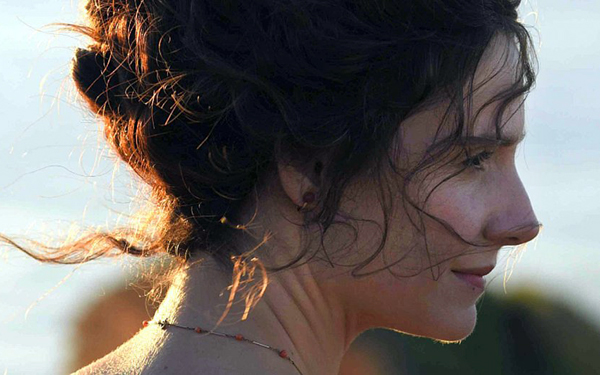With A Woman’s Life, French filmmaker Stéphane Brizé presents a spare yet powerful account of the heartbreak of a faithful wife, betrayed by her husband’s infidelity and irresponsibility.
Based on the 1883 novel Un Vie (A Life) by Guy de Maupassant, A Woman’s Life tells the story of Jeanne (Judith Chemla), the aristocratic daughter of educated parents, and her doomed marriage to the handsome local viscount Julien (Swann Arlaud), who reveals himself as unfaithful in finances as love.
Her story unfurls and collapses before our eyes, Jeanne’s delusions of the joys and potential of life falling away as she confronts the cold realities that lie just outside her privileged upbringing.
In a climate where women’s rights still find themselves under question in even the more enlightened parts of the globe, a film such as A Woman’s Life is a powerful reminder of the world as it once was not so long ago – and still may be.
Speaking with Creative Screenwriting at the COLCOA (City of Light, City of Angels) French Film Festival in Los Angeles, where A Woman’s Life won the Critics Award, director Stéphane Brizé elaborates on finding just the right time for a project, how to tell a costume designer that you’re going to throw mud on a vintage dress, and what to say to someone who insists films are for the intellect only (hint: it is not polite).

Swann Arlaud as Julien and Judith Chemla as Jeanne in A Woman’s Life
A Woman’s Life is the story of a young woman who finds herself slowly but surely betrayed, not just by her husband but by her own expectations of life. In anyone else’s hands this might have been bleak, but somehow it’s also powerful and moving.

Stéphane Brizé
© 2009 Lorber Films
Thank you for your kind words. What I find is that exactly where you see the sublime in the story, the beauty, there lies the tragedy. It is because of this intimately enmeshed tragedy and beauty that I was fascinated by this story. There was an intimate closeness between the character and myself, the difficulty for me – and the impossibility for Jane – of letting go of the illusion of childhood.
It’s interesting that this period film follows your previous work, The Measure of a Man, which takes place in the blue-collar world of factory workers in modern day France. That must have been quite an adjustment. Do you feel A Woman’s Life says something different today than when it was conceived?
Despite being from different periods, both films talk about the end of illusions. By leaving the story in the 19th century I am trusting that it is a universal, because this family – Jane’s mother and father – are not the typical representation of the aristocracy of the 19 century.
I think it is an extremely relevant feeling for our society today.
Upon reading the story did you know right away that you wanted to turn it into a film?
Yes. The first time I read the book – at that time I had made my first film (Hometown Blue, 1999) – I knew at that moment that I would like to make this film. But I didn’t know when. It was not the right moment.
It was not the right moment for you, you mean?
It was not the right moment for me. I needed more experience about cinema.
After A Few Hours of Spring (2012), I knew it was the right moment. So I started to write on A Woman’s Life with my co-writer Florence Vignon.

Vincent Lindon as Alain Évrard and Hélène Vincent as Yvette Évrard in A Few Hours of Spring © Michaël Crotto
While the novel is a linear progression through time, the movie and script employ flashbacks and forwards that often take you by surprise, to wonderful effect.
This back and forth in time does not exist in the novel. Nevertheless, I always keep in mind, I have to make the story dynamic. That never changes. We leap from one time period to another, like the mind goes from one memory to the next.
Another change seems to be from point of view – here it is exclusively from Jeanne’s perspective. What drove that decision?
During the editing of Measure I rewrote the script of A Woman’s Life. I wanted it to be from the point of view of Jeanne – only Jeanne. It was not the case of the script before. It’s a new part of my life, to focus only on the main character. She becomes a part of the plot, which is very, very interesting. I knew I needed to find a very good actor.
Which you did – Judith Chemla is amazing in the role, transforming herself from almost childlike in innocence to colder and more wounded in middle age.
She’s a gift! She’s a gift of God.

Swann Arlaud as Julien and Judith Chemla as Jeanne in A Woman’s Life
There are some interesting technical details with the film – the square aspect ratio instead of widescreen, the hand-held takes, which give an immediacy, and also other touches. Unlike the typical period costume drama, there is a grittiness here. For example, in one scene, the bottom of Jeanne’s dress is wet from her walking through the garden. How did those touches come about?
When I shoot, I am a guest on the set. I must create the illusion that life is happening, and I had a chance to do so there. You can’t imagine the fight on the set! I talked to the costume designer, the assistant; “You are going to put mud on her dress. Because they woke up at 7 o’clock this morning. They don’t smell as good, because it’s hot.” And so there is a life, there is a life before the scene.
Along with the visual details, there is realism to the level of emotion played out onscreen. It may seem reserved on the surface, but these characters suddenly explode in emotion – again, something not expected in a period film like this.
For me, making a film is creating emotion. It’s only that. You have to build a story for creating emotion. If you are in the cinema, you must have emotion. When you leave the cinema, you must leave with the reflection of emotion.
You know in France, it’s not so fashionable. “It must speak only to my brain.” Fuck you. We need to create emotion. It’s why people go to the cinema.

Judith Chemla as Jeanne and Swann Arlaud as Julien in A Woman’s Life
To allow yourself to feel so strongly when you create, do you ever feel overwhelmed? How do you go back to everyday life?
It was after eight months of writing that I realized I wanted to do a different thing, because it was so dark. I thought to myself, I’m not strong enough to stay. So I stopped for a few months. Then in March of 2013, I told my producer, “Every day, I think about Jeanne. So I will start again the work and I will never stop.” One year after that I finished the script.
It seems as if every film is a learning experience for you. What did you learn on this film that you will bring to the next film?
I only know 10 or 15 percent of what will happen on a film. If I know too many things, it’s not important for me to make the film. It’s a life experience. It’s very important for me to know where I want to go, but I refuse to know how I will go.
A Woman’s life is in selected theaters from Friday 12th May.
Featured image: Judith Chemla as Jeanne in A Woman’s Life.
[addtoany]

